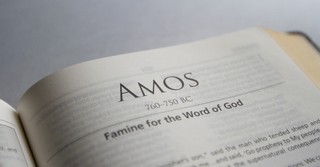Why Does God Want Justice to Roll Down Like a River?
Share

The prophets of the Old Testament obeyed their God, communicating His messages, His commands, and His prophecies. Some carried messages only for Israel, others to the whole world. Some were born to be prophets, while others heard the call later in life.
Amos carried messages to several audiences after years of working as a shepherd. His book of prophecy touches on contemporary issues in Damascus, Tyre, and Jerusalem. It recounts visions and judgment. It also chastises Israel for worshipping false gods and mistreating the poor.
During one of these chastisements, it is declared, “But let justice roll down like waters, and righteousness like an ever-flowing stream” (Amos 5:24). In context, God wanted His chosen people to obey Him, by ruling justly and behaving righteously, to stop living as hypocrites and idolaters and return to Him.
Photo credit: Pexels/Johannes Plenio
What Is the Context of Amos 5:24?

In chapter 5 in the Book of Amos, God is speaking to Israel. He communicates several messages, and “thus says the Lord” repeats three times. After David and Solomon, there were some good kings of Israel and Judah, but there were many who turned from the precepts of the Lord. By the time these messages were communicated, the culture had devolved into idol worship and wickedness. First, the Lord foretells the exile of the Israelites, talking about the future reduction in the population. The second message from the Lord in this chapter encourages the nation to, “seek the Lord and live” (Amos 5:6a). He says, “let justice roll like a river” in the third message.
The phrase is not on its own. In its full context, the message reads,
“I hate, I despise your feasts, and I take no delight in your solemn assemblies. Even though you offer me your burnt offerings and grain offerings, I will not accept them; and the peace offerings of your fattened animals, I will not look upon them. Take away from me the noise of your songs; to the melody of your harps I will not listen. But let justice roll down like waters, and righteousness like an ever-flowing stream” (Amos 5:21-24).
Here, God emphasizes each of the events and sacrifices mandated by Levitical law - feasts, assembling together, burnt offerings, grain offering, and peace offerings - and rejects them.
Centuries earlier, God gave Moses the Ten Commandments and the Levitical Law to show how to live a righteous life, govern justly, and to atone for sins. Even though the people were enacting these religious rituals, they did so without love for God, or love for their neighbor.
Earlier in the chapter God said, “They hate him who reproves in the gate, and they abhor him who speaks the truth. Therefore because you trample on the poor and you exact taxes of grain from him, you have built houses of hewn stone, but you shall not dwell in them” (Amos 5:10-11). Israel was clinging to its routine, but did not have the love and compassion that marked them as people of God.
Here, God clarified that He would prefer to see them conduct their affairs justly, and live righteously, before He would accept their offerings. In the New Testament, the Apostle John would reinforce and clarify this point, saying “anyone who does not love does not know God, because God is love” (1 John 4:8). God called on His people to have the love for Him and for others that they once did.
Photo credit: ©Sparrowstock
What Does "Let Justice Roll Like a River" Mean?

Understanding the nuance of this verse requires seeing it in two parts: what does justice mean in context? What does it mean for it to roll like a river?
The word in the Hebrew for justice is mishpat (מִשְׁפָט). This word has legal implications. Some definitions from various concordances include, “an act of deciding a case,” “case or cause presented for judgment,” “judgment,” and “the execution of judgment or justice.”
Of course, some judgments are not just. So choosing to translate the word mishpat as justice when talking about judgment that aligns with God’s justice can be seen as an appropriate translation; most translations chose to do so.
The other part of this phrase is the idea that justice should roll like a river. This imagery brings forth the image of constant movement. The river is always rushing towards a larger body of water. In this way, correct judgment, or justice, in human matters should have been constant, something Israel always should have strived to achieve. They turned away from the Lord’s justice, instead behaving in a way characterized as, “you who afflict the righteous, who take a bribe, and turn aside the needy in the gate” (Amos 5:12b). Instead of being an oasis in the dessert, where God’s nature was demonstrated through the lives of Israel, it had become a sad trickle, where injustice was common.
There is little variance in the way this verse is translated, though there are some slight differences. These differences are semantic, either alternating between judgment or justice, changing the adjective in front of “stream,” or similar changes that do not alter the meaning of the verse.
Examples:
KJV: “But let judgment run down as waters, and righteousness as a mighty stream.”
CSB: “But let justice flow like water, and righteousness, like an unfailing stream.”
GNT: “Instead, let justice flow like a stream, and righteousness like a river that never goes dry.”
Photo credit: ©Getty Images/Utah778
Who Wrote Amos?

Amos was a prophet of Israel as a contemporary of Isaiah and Hosea. At this point in Israel’s history, there were two kingdoms, the northern kingdom of Israel and the southern kingdom of Judah. Amos was from Judah, but became a prophet to the north.
It is generally accepted that Amos was the first of the prophets to write his message, and that he wrote them himself, implying a good education. He is also an example of someone who God called to ministry later in life, as a type of second career.
Of himself, Amos wrote, “Then Amos answered and said to Amaziah, ‘I was no prophet, nor a prophet's son, but I was a herdsman and a dresser of sycamore figs. But the Lord took me from following the flock, and the Lord said to me, ‘Go, prophesy to my people Israel’” (Amos 7:14-15). He did not come from a special line of prophets or priests. He was a tradesman who God called to a faraway land to give warnings about the results of disobedience.
The Book of Amos is broken into three sections. The first chapter has judgments against Israel’s neighbors Damascus, Gaza, Tyrr, Edom, and the Ammonites. The second are judgments against Israel and Judah. Chapters 3-5 are styled as sermons which outline the transgressions of the people in the first half of each chapter, and the second half contains the decreed judgment. The remaining chapters are the visions God sent Amos which represented coming disasters and judgments in Israel’s future. It emphasizes that Israel is as accountable for their sins, and the state of their hearts as their neighbor.
They worshipped the same idols and treated the poor as badly as their neighbors; going through the motions of sacrifices and feasts did not change the state of their hearts. It also shows that God wants justice for all people. To the unjust He said, “Seek the Lord and live, lest he break out like fire in the house of Joseph, and it devour, with none to quench it for Bethel, O you who turn justice to wormwood and cast down righteousness to the earth!” (Amos 5:7). It is important to note that God expects His chosen people to live up to this standard, because they know how they should treat others.
Photo credit: Unsplash/Ben White
What Does God's Justice Look Like?

God’s justice is perfect. He understands the depth of a sin, and the appropriate response. He calls on His people, which today includes the church, to strive to treat one another fairly and deliver appropriate justice.
One of the ways He does this is by setting up governments. The Apostle Paul wrote, “...for he is God's servant for your good. But if you do wrong, be afraid, for he does not bear the sword in vain. For he is the servant of God, an avenger who carries out God's wrath on the wrongdoer” (Romans 13:4-5). It is the primary purpose of the government to fulfill laws that punish crime to enact earthly justice. Because man is sinful, governments often fail at achieving this perfect justice. All societies have failed at this task.
One behavior that is not God’s justice is taking justice into one’s own hands. It is not for man to seek retribution or revenge. “ Beloved, never avenge yourselves, but leave it to the wrath of God, for it is written, ‘Vengeance is mine, I will repay, says the Lord’” (Romans 12:19). Even when people behave wrongly, or when the government fails, believers should not try to rectify the situation themselves. God will one day sit on a throne of judgment, where He will dispense perfect justice.
In light of the day of judgment, God has tempered His right to perfect justice with His perfect mercy. Romans 3 states that all deserve to receive punishment, and fail to live up to God’s holiness by sinning against Him and others. While it can be easy to look at others and hope that God will dispense justice against them, or for them, it is important to remember that if God only acted as the true judge, all would be found guilty in His court.
Photo credit: Unsplash/Rawpixel
God's Unfailing Justice

When Jesus died on the cross, He paid the price for mankind’s sin. For those who accept this free gift of mercy and grace, they are pardoned, and will not be judged for their sins, but only for their deeds. For those who already believe in the power of the cross, and are saved from the judgment of their sins, they are commissioned, like Israel was, to love God, love others, and share the good news about redemption.
Striving to be a person who values justice, and to be a community where justice flows like a river, is important. Doing what is right and ensuring that wrongs are addressed is part of God’s design for people while they live in this sin-filled world. Like God did for us, tempering this justice with mercy, and knowing that flawed humans will never truly achieve it is also important.
Look to God for true justice and eternal mercy, because He does not fail. One of the commands to Israel in the Book of Amos is equally applicable today: ”Hate evil, and love good, and establish justice in the gate; it may be that the Lord, the God of hosts, will be gracious to the remnant of Joseph” (Amos 5:15).
Sources:
Baxter, J. Sidlow. Explore the Book. Grand Rapids: Academie Books, 1960.
Birch, Bruce. Hosea, Joel, and Amos. Louisville: Westminster John Knox Press, 1997.
Strong, James. Strong’s Exhaustive Concordance of the Bible: Updated and Expanded Edition. Peabody: Hendrickson Publishers Marketing, LLC, 2007.
Wilmington, H.L. Wilmington’s Guide To the Bible. Wheaton: Tyndale House Publishers Inc., 1981.
Photo credit: ©Getty Images/Gordon Images
Bethany Verrett is a freelance writer who uses her passion for God, reading, and writing to glorify God. She and her husband have lived all over the country serving their Lord and Savior in ministry. She has a blog on graceandgrowing.com.